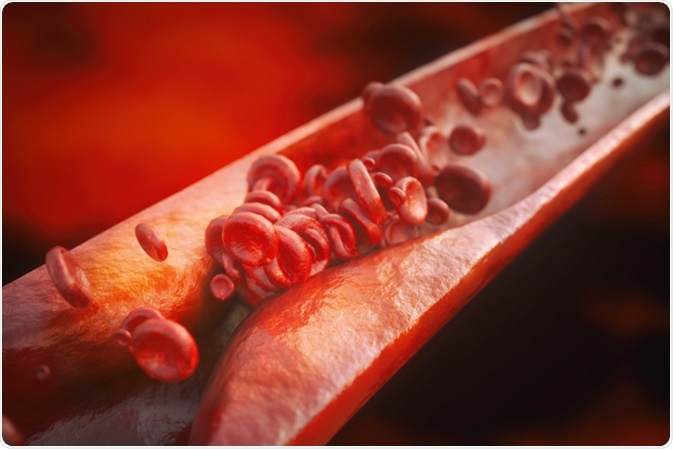Coronary heart disease is a pandemic that has seen a major increase in incidence over the past decade. There are many risk factors that contribute to the formation of coronary heart disease, some of which are recently being exhibited more by the general population.

Image Credit: Crevis / Shutterstock
What is Coronary Heart Disease?
Coronary heart disease (CHD) is a disease in which plaques build up inside the coronary arteries. This can block the supply of oxygen-rich blood to the heart muscle, which can cause various symptoms ranging from angina to heart attacks in more severe cases.
The build-up of plaque is a result of atherosclerosis. The plaque is made from fat, cholesterol, calcium, aggregated blood cells, and aggregated white blood cells (mainly lipid-laden macrophages). Over time the plaque hardens which narrows the arteries. If the fibrous cap covering the plaque is damaged, the blood is exposed to blood-clot inducing factors within the plaque. This can result in the formation of blood clots causing blockage of the blood vessel, which normally leads to the more serious symptoms such as a heart attack.
How coronary heart disease (atherosclerosis) develops | Bupa Health
Symptoms of Coronary Heart Disease
The most common symptom of CHD is angina. Angina is chest pain or discomfort that arises if an area of your heart muscle isn’t getting enough oxygen-rich blood.
If the flow of blood to a section of the heart muscle is cut off, then a heart attack will occur. If the blockage isn’t treated fast enough the heart muscle begins to die, which causes long-lasting issues.
CHD can also cause heart failure, when the heart can’t pump enough blood to meet the body’s needs. This can cause fluid to build up in the lungs making it hard to breathe, which results in shortness of breath.
CHD can cause cardiac arrhythmias, where the heart beats in an irregular rhythm. The heart can be beating too fast (Tachyarrhythmia) or too slow (Bradyarrhythmia). Arrhythmias can cause heart palpitations, and some arrhythmias can cause the heart to stop beating entirely, which is referred to as sudden cardiac arrest.
Risk Factors for Coronary Heart Disease
The incidence of CHD has risen in the past decade, this can be explained due to the increase in the prevalence of the risk factors associated with CHD. The main risk factors for CHD include:
- High levels of LDL cholesterol
- High blood pressure
- Smoking
- Diabetes
- Obesity
- Physical inactivity
Smoking, LDL cholesterol, and high blood pressure put a strain on the endothelial walls of the blood vessels. This leads to damage of the blood vessel walls. The LDL cholesterol can now aggregate in the damaged part of the blood vessel which sets up the basis of a plaque. Diabetes, obesity, and physical inactivity increases the amount of LDL cholesterol in the bloodstream and contributes to the high blood pressure and increased damage to the blood vessel wall.
Treatment for Coronary Heart Disease
Treatments for CHD vary greatly depending on the severity. The treatments include lifestyle changes, medicine, medical procedures, and surgery.
Lifestyle Changes
The lifestyle changes include healthy eating, exercising, and quitting smoking. These changes aim to reduce the development of atherosclerotic plaques, which effectively reduces the risk of worsening the CHD.
Medical Procedures and Surgery
This form of treatment for CHD fall under 3 main categories:
- Percutaneous coronary intervention
- Coronary artery bypass surgery
- Cardiac transplant
Percutaneous coronary intervention (PCI) is also known as an angioplasty. This involves introducing a thin tube with a balloon on the end through the blood vessel into the blocked/narrowed coronary artery. The balloon is inflated once it is placed, which opens the artery restoring the flow of blood. A stent can also be used instead of a balloon. Re-blocking of the stent can occur, which is referred to as restenosis. Restenosis can be reduced by using drug-eluted stents, these are stents that slowly releases a drug that blocks cell proliferation.
Coronary artery bypass grafting is a process that takes veins or arteries from other areas in the body to bypass the narrowed/blocked coronary arteries. This greatly improves the blood flow through the heart reducing the symptoms of CHD.
If the blockage of coronary arteries is very severe and other medical interventions are not an option, then cardiac transplant surgery may be considered. This procedure involves replacing the extremely damaged heart with a more healthier heart from a donor. This procedure has problems associated with rejection.
To summarize, coronary heart disease is a problem with many causes and risk factors. In some cases, the progression of the disease can be completely halted by simple lifestyle changes. In other cases, medical and surgical intervention is needed. With more research into coronary heart disease and its treatments, knowledge of how to prevent it and how to more effectively treat it will become available.
Further Reading
Last Updated: Jun 28, 2019